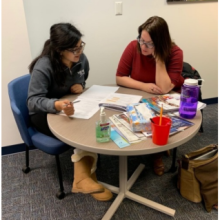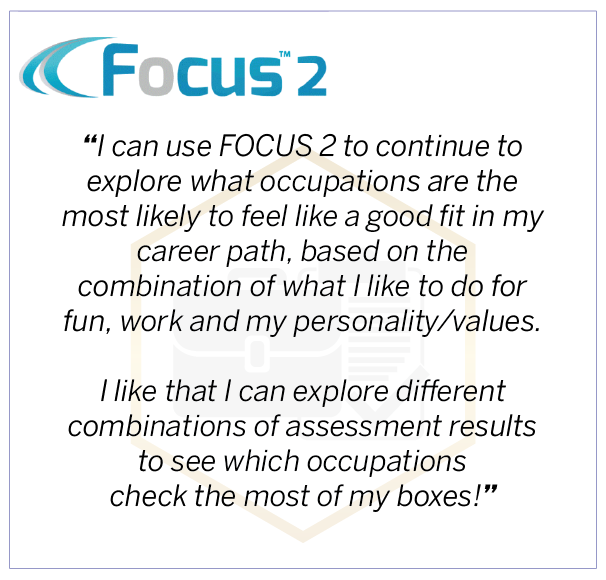Exploring Majors and Careers
Planning for Your Career
 Whether it's deciding on a major, discussing a career change, making the connection from your major to a career pathway, or preparing for a career or post-graduate education, Career Services can help you take a pro-active approach to your professional and career development.
Whether it's deciding on a major, discussing a career change, making the connection from your major to a career pathway, or preparing for a career or post-graduate education, Career Services can help you take a pro-active approach to your professional and career development.
Exploring options for your major or career is one of these steps - how do you figure out what career path might be a good fit for you? The resources below can help you learn about and reflect on your knowledge, skills and abilities; interests, values, strengths and passions; and workplace preferences.
Remember you can always set up an appointment to speak with a career coach to review your results or to discuss any questions and explore possibilities.
As you explore these tools and develop your professional skills, consider joining Talent Gateway and earning points towards the (M)Talent distinction and the Self & Career Development badge.

- Free, online career inventory that suggests careers that match your interests, skills, work-related values, and style preferences.
- Map out your career and educational goals, action plans, personal development and training needs.
- As you go through the inventory, "go with your gut" and use your first thoughts; don't overanalyze your responses - there are no "right" or "wrong" answers.
To login to Focus2Career, use goblue as the access code.
Related Talent Gateway challenges:
- Kickstarting Your Career Planning eLearning Block (1000 points)
- FOCUS on You! (1500 points)
- What am I Doing Here...? (250 points)
What can I do with this major? Helps you consider just that!
- Read about career fields, types of potential employers, and strategies to enhance your career options for each major.
Related Talent Gateway challenges:
- What Can I Do With This Major? (500 points)
- Eeny, Meeny, MINOR, Mo (500 points)
- Keeping Current: Find an Article About Your Major (250 points)
My Next Move by O*Net Online
- Database has tasks, skills, salary information, and more for over 900 different careers.
- Find careers through keyword search; by browsing industries that employ different types of workers; or through the O*NET Interest Profiler, a tool that offers personalized career suggestions based on a person's interests and level of work experience.
Related Talent Gateway challenges:
- Discovering Your Occupation (500 points)
- Setting Career Goals (750 points)
- What Workers Do: Find Salaries and Job Outlook for Careers of Interest (750 points)
Career Guides by Major: These guides are produced by the University of Michigan (Ann Arbor) Career Center, and highlight the skills and abilities that fit that major.
Considering Graduate School?

Maybe you've just finished your bachelor's degree and it's always been your plan to pursue an advanced degree. Or maybe you've been out of school for several years and want to go back to increase your marketability. Whatever your reason is, Career Services is here to help you meet your goals and assist through all stages of the process! We encourage you to set up a time with one of our staff members to discuss your ideas and questions.
Additionally, the UM-Dearborn Graduate Studies department has developed a graduate school planning guide that can be helpful no matter where you plan to pursue your advanced degree - check it out, and let us know how we can help!
Related Talent Gateway challenges:
- Academic Scan: Why Consider Graduate School (250 points)
- Attend a Graduate School Open House or Info Session (500 points)
- Career Scan: Graduate Student Interview (750 points)
